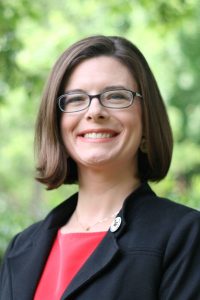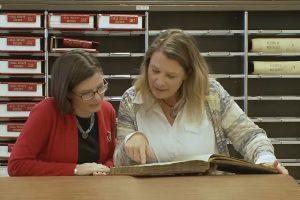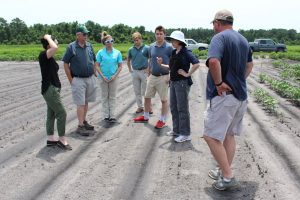Sharing Perspectives on Community Adaptations
By Katie Mosher
Posted June 29, 2016

Jessica Whitehead of North Carolina Sea Grant is bringing her experience working with coastal communities to a new national panel. Even today, she is meeting with officials in Nags Head.
The National Oceanic and Atmospheric Administration announced today that Whitehead is a member of the new federal Advisory Committee for the Sustained National Climate Assessment. The panel will advise NOAA on products and activities, including engaging stakeholders.
“I am honored to serve with such distinguished professionals in this field,” she notes. The national Sea Grant Climate Network nominated Whitehead, who is the North Carolina program’s coastal communities hazards adaptation specialist and also chairs the national Sea Grant climate group.
“A strength that I bring is my experience helping citizens in the coastal Carolinas use information about weather and climate to make better decisions about their lives and livelihoods.”
Recent North Carolina projects include working with Hyde County, where its low-lying mainland has an economy focused on agriculture, along with fishing and forestry. “We have looked at communities’ vulnerabilities to flooding and storm surge — and options to reduce damages that also help Hyde County earn discounted flood insurance rates,” she explains. Those efforts have been in partnership with local officials and Georgia Sea Grant.

In Nags Head on the Outer Banks, town officials sought Sea Grant’s help to identify how to maintain infrastructure over the next 30 years, particularly water and septic systems, and roads. Lisa Schiavinato, North Carolina Sea Grant’s law, planning and community development specialist is providing expertise to the town as well.
Both Hyde County and Nags Head initiated discussions using the Vulnerability, Consequences and Adaptation Planning Scenarios process, known as VCAPS, where community meetings produce diagrams of existing and anticipated hazards.
“One of the items that came out of our sessions with Hyde County was getting better discounts on flood insurance through the Community Rating System. It’s been great to work with them and Georgia Sea Grant to learn about specific steps they can take to become more flood resilient — and get more CRS points. If they get enough points they get additional discounts on flood insurance for everyone in the county with a federal flood insurance policy,” Whitehead explains.
As part of the project, Whitehead led the development of the video below as an outreach tool for educating county residents about their options for home elevation.
“Overall, VCAPS sessions have helped 17 communities along the Gulf and Atlantic coasts better understand weather and climate hazards, their communities’ vulnerabilities to these hazards, and adaptation options that could increase community resilience,” adds Whitehead, a co-creator of the process along with colleagues at the Social and Environmental Research Institute and the Carolinas Integrated Sciences and Assessments Program, or CISA.
“We value Jessica’s ability to listen to community concerns and encourage innovative solutions, while adding a scientific perspective,” says Susan White, North Carolina Sea Grant executive director. “In addition, she offers leadership in training others to facilitate such important discussions.”

Whitehead has worked not only with communities in the Carolinas, but also in Maryland, Georgia and Maine, and provides VCAPS training at regional and national meetings.
She is based at North Carolina Sea Grant’s headquarters on Centennial Campus at N.C. State University.
She grew up in Charleston, South Carolina, seeing early the impacts of storm-related flooding even before earning her bachelor’s degree from the College of Charleston.
“I learned about disaster resilience the hard way,” she recalls with a smile. “I had to watch my mom get our townhouse repaired after Hurricane Hugo. As a teenager, I ended up with my car parked in our high school’s flooded student lot downtown more times than I should probably admit.”
She went on to receive graduate degrees from Pennsylvania State University, where her doctoral dissertation focused on building scenarios to determine the capacities of small drinking-water utilities to adapt to climate change.
Prior to joining North Carolina Sea Grant, Whitehead was the regional climate extension specialist for the South Carolina Sea Grant Consortium, North Carolina Sea Grant and CISA.
- Categories:


